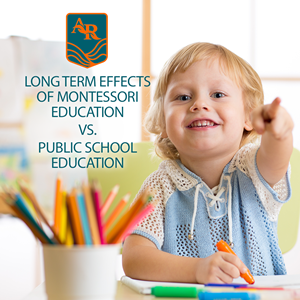
You’re likely aware that Montessori education differs significantly from conventional learning models found in public schools, but did you know that Montessori education has vastly different long term effects on children? It’s true!
The content delivery in Montessori classrooms is largely dependent upon each child’s individual inquiry and self-guided learning. A hands on, interactive classroom where children can move freely, as well as a lack of standardized testing all works together to form the Montessori education model. It’s these principles of the Montessori pedagogy that play a massive role in students’ brain development that follows them throughout their lifetime.
Montessori students have higher executive functioning and self-regulation skills.
Executive functioning and self-regulation are key factors in retaining information and maintaining self-control. Working memory, mental flexibility, and the ability to control impulses are all largely intertwined. These skills are not present at birth and must be formed during childhood. Montessori classrooms enable children to learn resilience, critical thinking, and problem solving skills through gentle guidance from experienced teachers.
These skills are emphasized in Montessori classrooms more so than in traditional public school classrooms. The repeated emphasis on these key concepts allows Montessori students to develop significantly more pathways within the brain which makes these life skills second nature for years to come.
There are significantly higher levels of creativity and language development in Montessori students.
Many Montessori classrooms allow for mixed-aged groups in early childhood as well as a continued theme of self-propelled learning through natural inquiry throughout the span of each child’s education. Music is also an important part of the Montessori classroom, which allows children to develop better non-verbal communication and increase language skills. Music has also been shown to improve spatial awareness in children through learning rhythms, patterns, and pitch.
It’s likely these factors that contributed to showing significant differences in a study of Montessori students and traditional public education students. The study examined a group of 12-year-olds. It found that Montessori students wrote essays that were “significantly more creative and (used) significantly more sophisticated sentence structures.”
Significantly smaller classrooms and a well-prepared learning environment are also key factors in fostering each student’s creativity in imagination and language development.
Montessori students have a greater sense of fairness and justice as well as better social awareness.
There’s so much more to the Montessori pedagogy than developing academically. The Montessori Method places a huge emphasis on developing the entire child – mind, body, and spirit. It’s no coincidence that when compared to students with public school education, Montessori students are leaps and bounds beyond them in regards to concepts of social justice and awareness.
The same study mentioned previously also found that Montessori students were significantly more likely than their public school counterparts to choose “positive assertive responses” when navigating negative social situations. The study also found that Montessori students had a greater sense of community and inclusiveness, especially in regards to their school environment.
The Montessori pedagogy has had proven results for decades. The brain development that is done in Montessori classrooms contributes to a lifetime of success in educational endeavours, careers, and interpersonal relationships. Children in Montessori schools are not just building foundations for their academic success, but for their entire lifespan.
